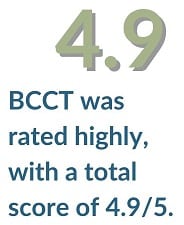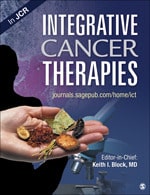Miki Scheidel and Laura Pole, RN, MSN, OCNS, reviewed and provided input on this post.
Therapy reviews on Beyond Conventional Cancer Therapies (BCCT, the pilot site for CancerChoices) rated highest in a recent study looking at quality and trustworthiness of information on complementary cancer therapies. Researchers from within the National Cancer Institute reviewed information on 11 websites, giving our reviews a score of 4.9/5—the highest rating of all sites.1Sansevere ME, White JD. Quality assessment of online complementary and alternative medicine information resources relevant to cancer. Integrative Cancer Therapies. 2021 Jan-Dec;20:15347354211066081.
When we created CancerChoices, we made substantial improvements to our research methodology, transparency, and presentation of information. CancerChoices.org serves the cancer community as the most comprehensive, balanced, patient-centered, free resource of its kind.
Complementary therapies include natural products, supplements, mind-body therapiesapproaches that enhance your mind’s capacity to positively affect your body’s function and symptoms. Some interventions focus on calming your mind, improving focus, enhancing decision-making capacity, managing stress, or resolving conflict. Other interventions have a goal of relaxing both your mind and your body., diets, energy therapies, off-label (repurposed) drugs, and more. Many have been shown to improve treatment outcomes, reduce symptoms and side effects, optimize body terrainthe internal conditions of your body, including nutritional status, fitness, blood sugar balance, hormone balance, inflammation and more, and/or reduce risk of recurrence. Visit our reviews for the evidence on medical benefits, safety, expert use, and costs of many complementary therapies used in cancer care.
The rating
The article, published in the medical journal Integrative Cancer Therapies, rated 11 websites on the quality and trustworthiness of their information on several complementary and alternative (CAM) cancer therapies. The authors are the director and staff at the National Cancer Institute Office of Cancer Complementary and Alternative Medicine—experts in assessing research.
The study was published before CancerChoices launched, but our predecessor site, Beyond Conventional Cancer Therapies (BCCT), was evaluated along with other leading sites providing information on complementary therapies related to cancer care.
The authors used a modified online health information evaluation tool to assess each site’s information on clarity of purpose, relevance, transparency regarding sources, balance vs bias, and other factors related to quality and trustworthiness of information. Each site was given an aggregate score on a scale of 1 to 5, with 5 the highest score possible.
BCCT received the highest rating among the sites evaluated, with a total score of 4.9/5. In fact, the authors wrote that BCCT and another site “are less visible and viewed websites, but based on our analysis they have high quality, reliable CAM information and, given their editorial practices, are good models for other CAM online resources.”2Sansevere ME, White JD. Quality assessment of online complementary and alternative medicine information resources relevant to cancer. Integrative Cancer Therapies. 2021 Jan-Dec;20:15347354211066081.

Our improvements since the rating
With the new CancerChoices website, we’ve made several improvements in how we research and present information in our therapy reviews and handbooks, all described in Therapy Ratings:
- More comprehensive: We conduct more thorough searches for relevant studies and articles, focusing on more recent research.
- Better assessment of study design and size: We identify each study by its design, whether a randomized controlled triala study design in which people are randomly assigned to either an experimental group or a control group to compare the outcomes from different treatments; an RCT is considered a strong design for determining a therapy’s effects, other controlled triala study design in which people are assigned to either an experimental group or a control group to compare the outcomes from different treatment; assignment is not random, and so this is not as strong a study design as a randomized controlled trial, but still stronger than an uncontrolled trial, observational studya type of study in which individuals are observed or certain outcomes are measured, but no attempt is made to affect the outcome (for example, no treatment is given); an example is a study that records people’s diets, but doesn’t try to alter their diets, and looks for patterns of disease or other outcomes related to different foods, uncontrolled triala study in which a therapy is used, but without a comparison group against which to judge outcomes; an uncontrolled trial is considered a weak study design or case studya descriptive and exploratory analysis of a person, group, or event regarding changes observed over time; because changes due to treatment are not compared to similar changes over time without treatment, a case study is considered a weak study design, or a combined (meta-analysisa statistical analysis that combines the results of two or more research studies; the results of smaller research studies addressing the same or similar questions can be analyzed as though they are one bigger, more powerful study) of studies. We also list the study size—clearly defined in categories—as the size of studies is one indication of the reliability of the findings.
- Assessments of evidence: We look at the evidence for each grouping of studies and assign it one of six levels from insufficient to strong evidence of an effect, or else no evidence of an effect. Each level of assessment is clearly defined. This gives intermediary “bottom line” assessments of a therapy’s effects with that specific population and situation.
- Recency of information: We update our reviews whenever notable new studies come to our attention, but we also conduct a full updated literature search for all our reviews every three years. We’re now listing both the dates of the last update and of the last full literature review.
- Focus on evidence in people: We evaluate and rate therapies mainly on the available human (clinical) evidence, which is much more informative than lab and animal (preclinical) evidence about whether a therapy has an effect in people with cancer. We evaluate preclinical evidence only if it adds information about effects not seen or studied in a clinical setting.
We also present information in more logical and consistent summaries of each study article than before. Each of our bullet-point summaries of studies includes the same five pieces of information in the same order—the medical effect (or absence of one), study population, therapy or practice used, comparison, and study size and design. This presentation allows us to order studies by their strength and assess the overall strength of evidence.
With these five key points about each study and a consistent format, we can easily group similar studies together—for instance grouping studies by the cancer type or by a characteristic of the population, such as “people with diabetes.” When many studies are available, we may even be able to group studies into very specific characteristics: studies of people receiving a therapy during conventional treatment in one group and those receiving the therapy after completing treatment in another group, for example.
This brief and consistent format also allows us to look for possible reasons for different outcomes across studies: Was the study population different? The dose? The timing of the therapy? The comparison treatment? We believe we’re able to make more sense of a large group of studies through this process.
We believe CancerChoices provides the most comprehensive assessment of the effective use of complementary therapies available anywhere.
We find this process helps us assess specific situations in which a complementary therapy is effective (or not), and we believe this provides the most comprehensive assessment of the effective use of complementary therapies available anywhere. Experts who have reviewed our therapy reviews have made extremely favorable comments about the quality of our research. Some examples:
- “This is fantastic! Excellent and impressive review.” (Ketogenic Diet ›)
- “I think you’ve done a remarkable job of researching, evaluating, and integrating a huge amount of data.” (Aspirin › and Non-aspirin Nonsteroidal Anti-inflammatory Drugs ›)
- “It’s an excellent summary.” (Melatonin ›)
Bottom line
CancerChoices is a resource you can trust. And we’re not the only ones who think so.
Learn more
References
Ms. Hepp is a researcher and communicator who has been writing and editing educational content on varied health topics for more than 20 years. She serves as lead researcher and writer for CancerChoices and also served as the first program manager. Her graduate work in research and cognitive psychology, her master’s degree in instructional design, and her certificate in web design have all guided her in writing and presenting information for a wide variety of audiences and uses. Nancy’s service as faculty development coordinator in the Department of Family Medicine at Wright State University also provided experience in medical research, plus insights into medical education and medical care from the professional’s perspective.

